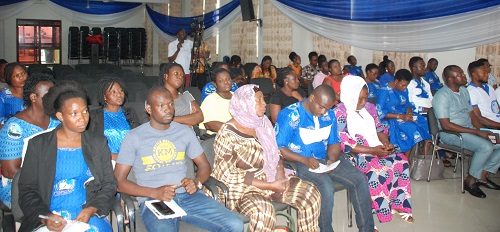
The Medical Director of the Greater Accra Regional Hospital (GARH), Dr Emmanuel Srofenyoh, has called for adequate stocking of blood banks in various health facilities across the country.
This, he explained would make blood readily available, especially for emergency cases to reduce the occurrence of obstetric haemorrhage, a leading cause of death among pregnant women in the country.
Obstetric haemorrhage, which involves loss of blood higher than 2500 ml accounts for 30 per cent of maternal deaths in Ghana, followed by hypertension which contributes 15 per cent.
Addressing the 2nd Quarter National Executive Meeting of the National Association of Registered Midwives-Ghana (NARM-GH) in Accra yesterday, Dr Srofenyoh deplored the high maternal mortality rate (MMR) despite various interventions to reduce maternal and neonatal deaths.

“Per the 2017 Ghana Maternal Health Survey (GMHS), the country’s MMR stands at 310 per 100,000 live births which accounts for 12 per cent of total deaths among women of reproductive age.
Blood is something that cannot be manufactured and we need as a country to take serious steps in ensuring adequate supply of blood at the blood banks and various health facilities all the time to save mothers during delivery,” he urged.
Dr Srofenyoh again observed a rise in hypertension as cause of deaths among pregnant women which he said “is gradually closing the haemorrhage gap” especially in major health facilities urging for increased efforts by front line health workers in saving the lives of pregnant women by detecting risk factors and taking appropriate action.
“Maternal mortality is really preventable if we are able to spot the early signs and administer prompt care. Most causes of these deaths may be due to family complications, transport, unavailability of logistics, inadequate knowledge on the part of health workers and poor referral systems.”
To the consultant, obstetrician and gynaecologist, the need to put in place appropriate pre-referral and emergency care management systems at the health facilities was critical to reducing maternal mortality.
He charged midwives to “always ensure that emergency drugs are available at our facilities to administer to pregnant women”, as they strengthened the “pregnancy school” module to empower pregnant women in ensuring safe delivery.
“Do not relegate your position as persons directly responsible for safe delivery care processes in the hospitals. Promote family planning services and let us ensure that we are abreast of changing trends to champion respectful maternal care,” he urged.
Acting Director General of the Ghana Health Service, Dr Patrick Aboagye, expressed worry that increasingly, traditional births attendants, prayer camps and healing centres were taking over the job of professional midwives “because people are not satisfied with the care we give.”
Citing the 2017 GMHS, which affirmed that about 52 per cent of women who received antenatal care at public health facilities were asked to make payments for laboratory tests, drugs, supplies and consultation among others, the Acting DG cautioned practitioners against the act.
On his part, Chief Director of the Ministry of Health, Nana Kwabena Adjei-Mensah was hopeful the newly developed national health policy (2019-2030) would promote much efficient health outcomes in line with goal three of the sustainable development goals.
Underlining the critical role of midwives to the health sector, the chief director expressed the ministry’s resolve to train, empower and expose practitioners to emerging trends in the health chain to protect the lives of pregnant women, mothers and newborns in the country.
Buttressing the need for skills enhancement and continuous training to bring midwives up to speed, president of NARM-GH, Madam Ridhwana Hawa Amoako Agyei, admonished members to “take issues concerning their education and development seriously, avail themselves when opportunities occur and compete for positions for which they have requisite qualifications.”
She appealed to the ministry to take a second look at existing structures in the various health facilities to reverse the trend where midwives were relegated to the background in matters relating to maternity.
BY ABIGAIL ANNOH AND MALISA TETTEH







